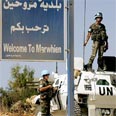
UNIFIL and UN troops stationed in Lebanon
צילום: איי אף פי
Catch-22 in Lebanon
UN force’s limited mandate means troops can only wait for next explosion
BERLIN - Before anyone seriously considers the possibility of dispatching international forces to the Gaza Strip, it would be worthwhile to conduct a thorough examination as to the relevancy of such initiatives in the Mideast reality. To this end, an examination of the efficiency of UNIFIL's bolstered forces in Lebanon would suffice.
In the corridors of the United Nations and the various capitals of Europe, preparations are underway to renew the mandate of this force, which was established last September following the ceasefire between Israel and Hizbullah. Yet even now it is clear to all the involved parties that the force's achievements are very limited: Arms are continuing to flow into the hands of Hizbullah and other armed organizations.
A new military deployment - perhaps even stronger than before - has taken root under the noses of the international forces stationed in southern Lebanon. This is taking place while the Lebanese government's ability to enforce its sovereignty has not really been bolstered.
The "bolstered" UNIFIL can boast two achievements: The presence of the force prevented – apparently, and for the time being – the collapse of the shaky Siniora government despite the series of political murders against its supporters; in addition, relative calm has been maintained since the deployment of the force along the Israeli-Lebanese border.
The German government undertook a great risk in complying with Lebanon’s and Israel's request to dispatch forces to bolster UNIFIL. In less than a year since that decision, many here in Berlin are inclined to regret it.
The decision to dispatch a German force to Lebanon was the right political decision, but an erroneous military decision, senior German defense establishment sources argue in hindsight, in light of the situation that has developed on the ground.
Chancellor Merkel, similar to her other colleagues in the European Union, sought to put an end to the military entanglement Israel had gotten itself into, bolster the incumbent Lebanese government, and get the peace process in the region back on track. Hence, these European governments agreed to dispatch their soldiers to the force, despite a mandate that didn't grant the troops any substantial authority to actively change realities on the ground or prevent renewed military conflict.
Frustrating waiting period
The "bolstered" UNIFIL mirrored the old UNIFIL, and all that remained for the international force to do was to wait for the next explosion, which could lead to escalation and culminate into war. Or alternately, UN soldiers would find themselves between the Israeli hammer and the Lebanese anvil.
Military experts in Berlin are already creating response scenarios to such an eventuality, in accordance with the UN's past experience.
One such scenario is the "Rwanda scenario" – calls by a UN force commander stationed in that country to receive reinforcements in order to prevent genocide went unheeded, and when the mass massacres spiraled out of control, UN troops stood idly by because their mandate did not permit them to intervene.
Then there's the "Croatia scenario": During the civil war that shattered Yugoslavia, the Serb minority in Croatia began preparing for ethnic cleansing in areas under its control. The UN dispatched a large helicopter force to the area; the Serbs became alarmed and folded.
And of course there is the "abandonment scenario": Vis-à-vis the danger of a renewed flare-up, UN soldiers would take their arms and other belongings and go home.
The waiting period for the next conflict is very frustrating. However, it is the international community that has created this catch-22. It is now too late to change the force's mandate. The facts that have been determined on the ground cannot be changed without engaging in a military conflict with Hizbullah – a conflict no one is willing to pay the price for.
Dispatching the international force to Lebanon has demonstrated once again that good will is not enough to resolve complex political situations and conflicts. While the international community is becoming entrenched in the Lebanese quagmire, we should perhaps act against the next catch-22 in the Gaza Strip.










